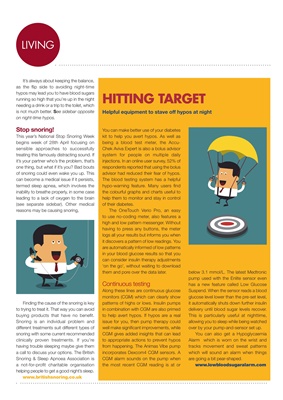
LIVINGLIVINGLIVING
It's always about keeping the balance,
as the flip side to avoiding night-time
hypos may lead you to have blood sugars
running so high that you're up in the night
needing a drink or a trip to the toilet, which
is not much better. See sidebar opposite
on night-time hypos.
Stop snoring!
This year's National Stop Snoring Week
begins week of 28th April focusing on
sensible approaches to successfully
treating this famously distracting sound. If
it's your partner who's the problem, that's
one thing, but what if it's you? Bad bouts
of snoring could even wake you up. This
can become a medical issue if it persists,
termed sleep apnea, which involves the
inability to breathe properly, in some case
leading to a lack of oxygen to the brain
(see separate sidebar). Other medical
reasons may be causing snoring,
Finding the cause of the snoring is key
to trying to treat it. That way you can avoid
buying products that have no benefit.
Snoring is an individual problem and
different treatments suit different types of
snoring with some current recommended
clinically proven treatments. If you're
having trouble sleeping maybe give them
a call to discuss your options. The British
Snoring & Sleep Apnoea Association is
a not-for-profit charitable organisation
helping people to get a good night's sleep.
www.britishsnoring.co.uk
HITTING TARGET
You can make better use your diabetes kit
to help you avert hypos. As well as being
a blood test meter, the Accu-Chek Aviva
Expert is also a bolus advisor system for
people on multiple daily injections. In an
online user survey, 52% of respondents
reported that using the bolus advisor had
reduced their fear of hypos. The blood
testing system has a helpful hypo-warning
feature. Many users find the colourful
graphs and charts useful to help them
to monitor and stay in control of their
diabetes.
The OneTouch Verio Pro, an easy
to use no-coding meter, also features a
high and low pattern messenger. Without
having to press any buttons, the meter
logs all your results but informs you when
it discovers a pattern of low readings. You
are automatically informed of low patterns
in your blood glucose results so that you
can consider insulin therapy adjustments
'on the go', without waiting to download
them and pore over the data later.
Continuous testing
Along these lines are continuous glucose
monitors (CGM) which can clearly show
patterns of highs or lows. Insulin pumps
in combination with CGM are also primed
to help avert hypos. If hypos are a real
issue for you, then pump therapy could
well make significant improvements, while
CGM gives added insights that can lead
to appropriate actions to prevent hypos
from happening. The Animas Vibe pump
incorporates Dexcom4 CGM sensors. A
CGM alarm sounds on the pump when
the most recent CGM reading is at or
below 3.1 mmol/L. The latest Medtronic
pump used with the Enlite sensor even
has a new feature called Low Glucose
Suspend. When the sensor reads a blood
glucose level lower than the pre-set level,
it automatically shuts down further insulin
delivery until blood sugar levels recover.
This is particularly useful at nighttime,
allowing you to sleep while being watched
over by your pump-and-sensor set up.
You can also get a Hypoglycaemia
Alarm which is worn on the wrist and
tracks movement and sweat patterns
which will sound an alarm when things
are going a bit pear-shaped.
www.lowbloodsugaralarm.com
Helpful equipment to stave off hypos at night